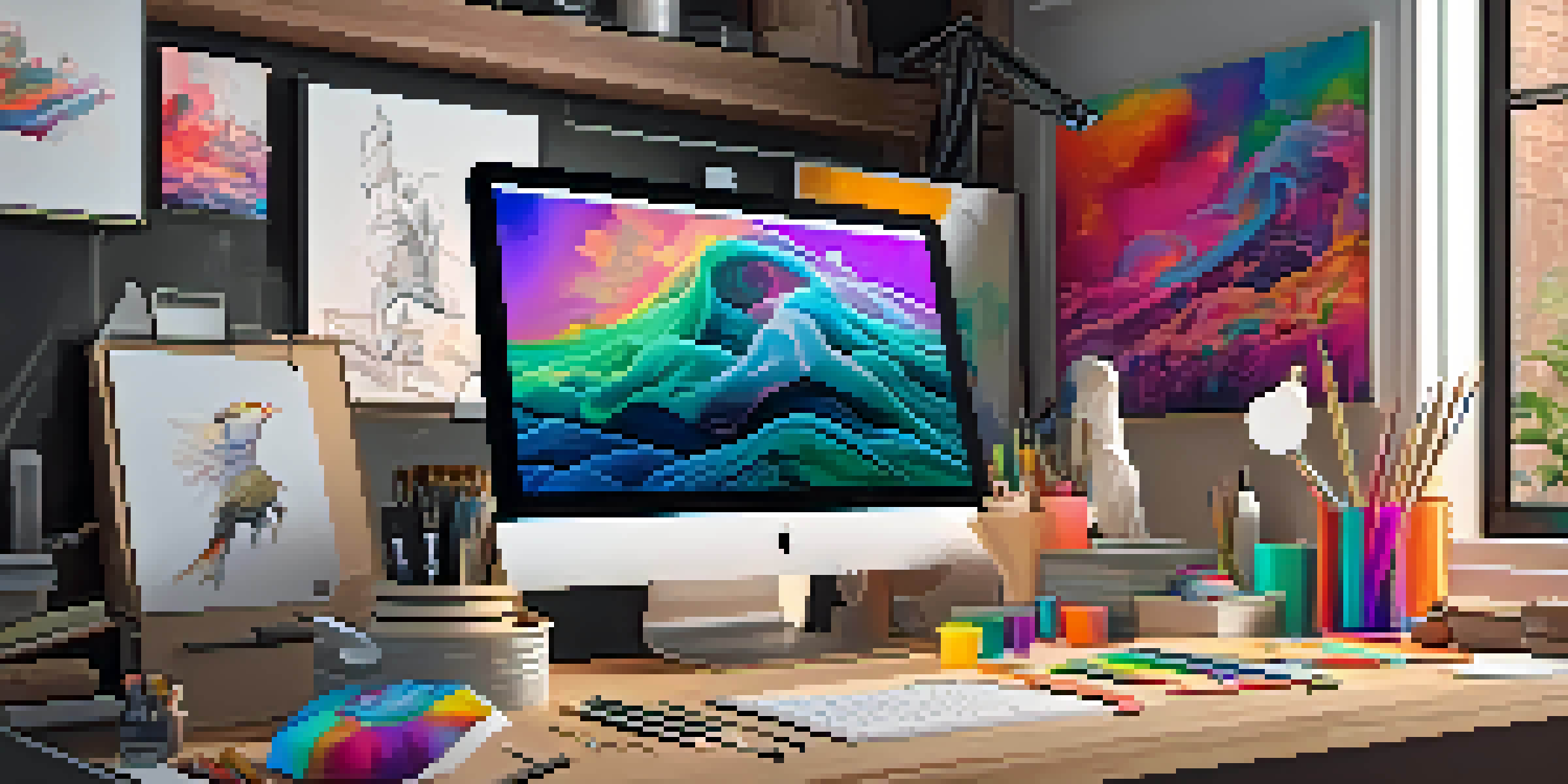The Role of Copyright in NFT Creation and Ownership

What Are NFTs and Why Do They Matter?
NFTs, or Non-Fungible Tokens, are unique digital assets verified using blockchain technology. Unlike cryptocurrencies, which are interchangeable, each NFT has distinct characteristics that set it apart. This uniqueness makes NFTs appealing to artists, collectors, and investors alike, as they represent ownership of digital art, music, and even virtual real estate.
Art is not freedom from discipline, but disciplined freedom.
The surge in popularity of NFTs has revolutionized the way we think about ownership in the digital realm. Imagine owning an original piece of art; with NFTs, you can have a verified claim to that digital asset. However, this new landscape raises questions about copyright and intellectual property rights, which are essential to understand before diving into the NFT space.
In essence, NFTs have created a new frontier where digital ownership intersects with traditional legal frameworks. As we explore the role of copyright, it’s vital to grasp how these concepts play together to shape the future of digital ownership.
The Basics of Copyright: A Quick Overview
Copyright is a legal concept that grants creators exclusive rights to their original works. This means that if you create something—whether it's a painting, a song, or a written piece—you automatically own the copyright to that creation. It allows you to control how your work is used, reproduced, or distributed, which is crucial in the digital age.

In the realm of NFTs, copyright plays a pivotal role in determining who can sell, display, or profit from these digital assets. For instance, an artist can create an NFT of their artwork, but unless they retain copyright, they may lose control over how that piece is used or sold in the future. Understanding your rights as a creator is essential in navigating this space.
NFTs Redefine Digital Ownership
NFTs provide a unique way to claim ownership of digital assets, raising important questions about copyright and intellectual property.
Additionally, copyright ensures that creators receive recognition and compensation for their efforts. This principle remains fundamental, even as the medium of expression evolves from canvas to code.
How Copyright Affects NFT Creation
When creating an NFT, it's essential to consider how copyright applies to the underlying work. If you're an artist minting your digital artwork as an NFT, you need to be aware of your rights and how they interact with the NFT itself. For example, if you sell an NFT without retaining copyright, the buyer may gain the ability to reproduce or modify your work.
In the world of digital art, ownership is transient, and the concept of copyright must evolve to reflect new realities.
Moreover, if you use someone else's work—like a song or an image—to create an NFT without permission, you could face legal repercussions. This highlights the importance of understanding copyright laws and ensuring that you have the rights to use any material that is not your own. If in doubt, seeking legal advice can be invaluable.
Ultimately, careful consideration of copyright during the NFT creation process can protect creators from potential disputes and ensure that their rights are upheld in the evolving digital landscape.
Navigating Ownership Rights of NFTs
Owning an NFT does not automatically confer ownership of the copyright to the underlying work. This distinction can be confusing for many buyers, as they may assume purchasing an NFT means they can use the artwork however they please. To clarify, the NFT serves as proof of ownership of a specific token, but the copyright may still belong to the original creator.
For example, when you buy an NFT of a digital painting, you own the token, but the artist retains the copyright. This means they can still sell prints, license the work, or create derivative pieces. Therefore, it's crucial for both creators and buyers to understand the specific rights that come with an NFT transaction, often outlined in the terms of sale.
Copyright Protects Creators' Rights
Understanding copyright is crucial for artists and buyers, as it determines how digital works can be used and monetized.
This ownership dynamic underscores the importance of clear communication between artists and collectors. Establishing agreements that address copyright and ownership rights can help prevent misunderstandings and foster a more transparent marketplace.
Licensing and Copyright in the NFT Space
In many cases, artists may choose to license their work when creating NFTs. Licensing allows artists to specify how their work can be used, which may include limitations on reproduction, display, or modification. This adds another layer of protection for creators while providing clarity to buyers about their rights over the NFT.
For instance, an artist could sell an NFT that grants the buyer the right to display the artwork in a virtual gallery but retains the right to reproduce it in other forms. This type of licensing can be beneficial for both parties, allowing creators to monetize their work while providing collectors with specific usage rights.
As the NFT market continues to evolve, understanding and utilizing licensing agreements will be crucial for artists. This ensures that their interests are protected and that buyers know exactly what they can and cannot do with their newly acquired digital assets.
Challenges and Legal Considerations in NFTs
The intersection of copyright and NFTs presents unique challenges and legal considerations. For one, the rapid growth of the NFT market has outpaced the development of clear legal frameworks, leading to ambiguity around rights and ownership. This lack of clarity can create potential conflicts, especially when multiple parties claim rights to a single work.
Moreover, enforcement of copyright in the digital realm can be complicated. With the ease of copying and distributing digital content, proving infringement can be challenging. Creators must be proactive about protecting their work, which may include registering copyrights or utilizing technology to track and enforce their rights.
Licensing Adds Clarity in NFT Sales
Licensing agreements help define the usage rights of NFTs, ensuring both creators and collectors understand their roles and limitations.
As the NFT landscape matures, ongoing legal discussions will shape how copyright laws adapt to this new medium. Staying informed about these developments is essential for anyone involved in the NFT space, whether as a creator, collector, or investor.
Future Outlook: Copyright and NFTs
Looking ahead, the relationship between copyright and NFTs is likely to evolve as the industry matures. As more creators and collectors engage with NFTs, there will be increased demand for clear legal guidelines that address copyright issues. This could lead to more standardized practices and agreements that benefit both artists and buyers.
Furthermore, as technology advances, tools may emerge to help creators protect their work and enforce their rights more effectively. Blockchain technology, for example, can provide transparent records of ownership and copyright, making it easier to track usage and potential infringements.

Ultimately, the future of copyright in the NFT space will depend on collaboration between artists, collectors, and legal experts. By fostering open dialogue and understanding, we can navigate this exciting new frontier while ensuring that the rights of creators are respected and upheld.